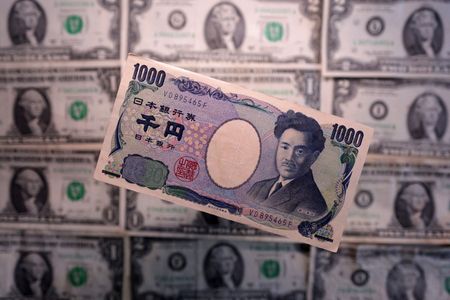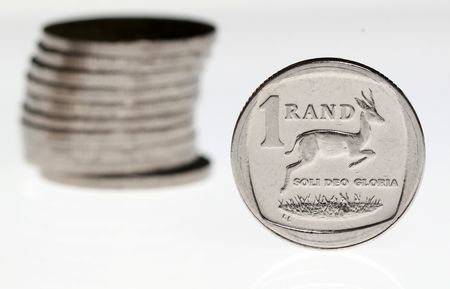By Karen Brettell
(Reuters) -The Japanese yen reached its weakest level since mid-February against the dollar on Wednesday on rising concerns about an increase in fiscal spending in Japan, while the euro fell on political uncertainty in France.
The moves helped boost the U.S. currency, which is also benefiting from a void of economic data as the federal government remains shut.
The surprise election of Sanae Takaichi to Japan’s ruling Liberal Democratic Party on Saturday has dented the yen on expectations of greater government stimulus.
“The market is running with the idea that the Takaichi government would be pursuing policies that are more similar to what we saw during the Abenomics years. In other words, expansionary fiscal policy and less restrictive monetary policy. But at the moment it’s obviously still an open question what the policies will be,” said Vassili Serebriakov, an FX and macro strategist at UBS in New York.
Former Japanese Prime Minister Shinzo Abe adopted expansive policies to combat Japan’s long-term deflation and stimulate economic growth after 2012.
Takaichi, Japan’s likely next premier, is already facing criticism from her ruling party’s long-time coalition partner, a rift that could delay or, in an extreme scenario, jeopardize her premiership.
Against the yen, the dollar was last up 0.45% at 152.59. It earlier reached 152.99, the highest since February 14.
The void of U.S. economic data that might point to a slowing economy is helping the dollar gain on peers.
“Once the focus shifted to developments outside of the U.S. and then there’s no kind of negative drag on the dollar from potentially weaker U.S. data, then the dollar is doing well,” said Serebriakov.
The Federal Reserve is widely expected to cut rates by 25 basis points at its October 28-29 meeting, and traders are pricing in 79% odds of an additional cut in December, according to the CME Group’s FedWatch Tool.
The U.S. central bank will release minutes from its September meeting later on Wednesday, which will be scoured for any new clues on Fed policy.
The euro was last down 0.19% at $1.1632 and reached $1.1605, the lowest since August 27.
French caretaker Prime Minister Sebastien Lecornu said on Wednesday a deal could eventually be reached on a 2026 budget despite the country’s political crisis.
Lecornu, France’s fifth prime minister in two years, tendered his and his government’s resignation on Monday, just hours after announcing the cabinet line-up, making it the shortest-lived administration in modern France.
The New Zealand dollar fell 0.38% versus the greenback to $0.5776 and reached $0.5735, the lowest since April 11.
New Zealand’s central bank cut its benchmark rate by a larger-than-expected 50 basis points on Wednesday as policymakers signalled concerns about the frail state of the economy and kept the door open for further easing.
In cryptocurrencies, bitcoin gained 0.97% to $123,199.56.
(Reporting by Karen Brettell; Additional reporting by Stefano Rebaudo; Editing by Andrea Ricci)











